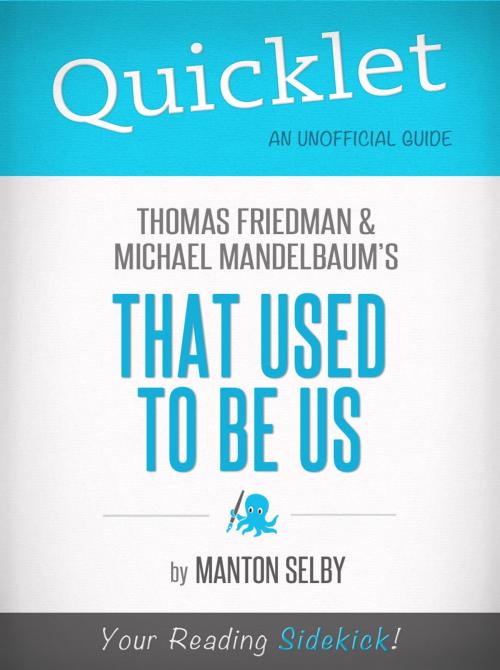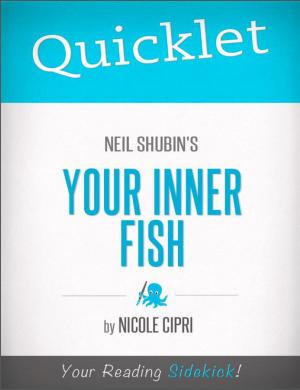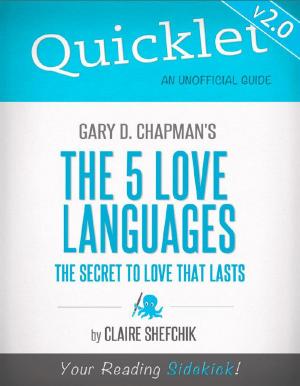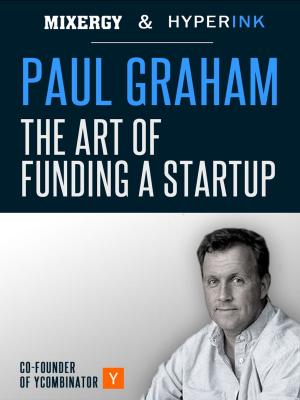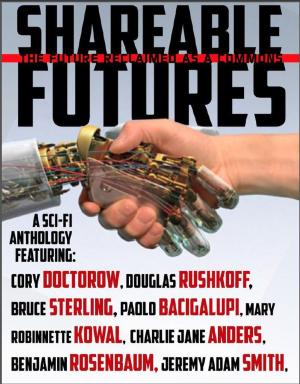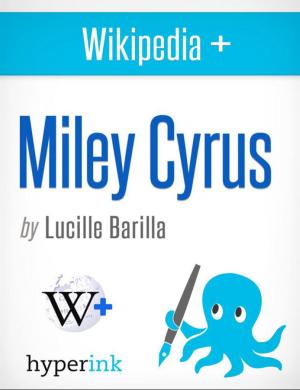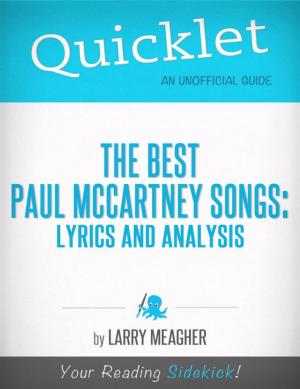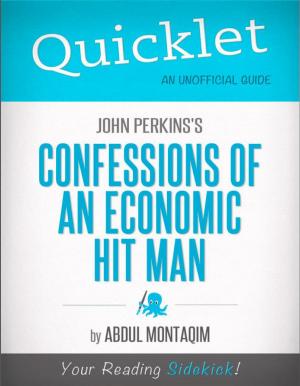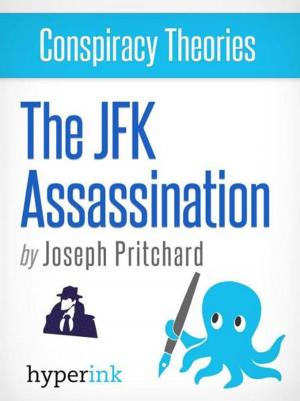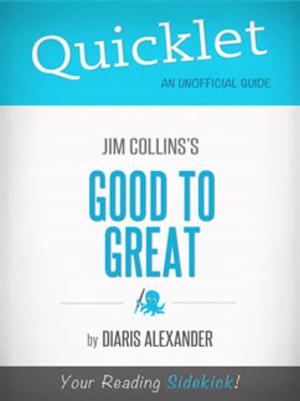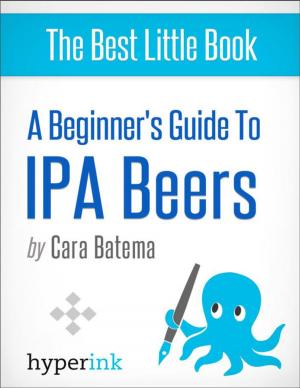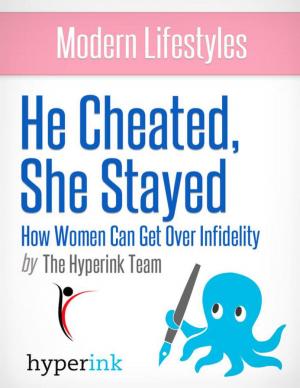Quicklet On That Used To Be Us By Thomas Friedman And Michael Mandelbaum (Cliffnotes-Like Book Summary)
Nonfiction, History, Americas, United States, 20th Century, Reference & Language, Study Aids| Author: | Manton Selby | ISBN: | 9781614643517 |
| Publisher: | Hyperink | Publication: | December 7, 2011 |
| Imprint: | Language: | English |
| Author: | Manton Selby |
| ISBN: | 9781614643517 |
| Publisher: | Hyperink |
| Publication: | December 7, 2011 |
| Imprint: | |
| Language: | English |
Quicklets: Learn More. Read Less.That Used To Be Us was written by Thomas Friedman (a New York Times foreign correspondent and columnist) and Michael Mandelbaum (Professor of American Policy at Johns Hopkins School of Advanced International Studies.)Friedman is the author of five bestsellers, including The World Is Flat and a three-time winner of the Pulitzer Prize. Friedman graduated from the University of Minnesota and Brandeis University summa cum laude and received a Masters in Philosophy from Oxford University. At The New York Times hes worked as the Chief White House Correspondent and as a reporter in Finance, International Economics, and Foreign Affairs. Mandelbaum is the director of the American foreign-policy program at Johns Hopkins University. He has served on the faculty at Harvard University (from which he received his PhD in Political Science), Columbia University, and the US Naval Academy. He is the author of multiple books, including The Case For Goliath: How America Acts As A World Government In The 21st Century. In That Used To Be Us, Friedman and Mandelbaum posit that creativity and the ability to meet great challenges is more important to the US than ever before. They paint a vivid picture of the economic and political failures that have lead to the current, downhill condition of America, and propose the actions that must be taken by the citizens, businesses, and government leaders of America to reverse its decline.BOOK EXCERPT FROM CHAPTER 2 OF THE TOM FRIEDMAN AND MICHAEL MANDELBAUM QUICKLET: THAT USED TO BE USWhen the Berlin wall collapsed, we felt as though we had achieved the destruction of our most dangerous enemy. We were deluded in our euphoria and made the most dangerous mistake a country can make: We assumed we had no more enemies.In 1946, George Kennan, the deputy chief of mission at the United States Embassy in Moscow drafted what became known as the Long Telegram in which he described the reality of the postwar conflict that was now brewing between the United States and Soviet Union. A condensed version appeared in Foreign Affairs magazine and became the most influential journal article in history.The Telegram impacted policymakers in Washington, and they were able to see the worlds geopolitical situation clearly. This led to the policy of Containment which consisted of the political resistance to Communist ideology and the physical containment of the Soviet Unions military might everywhere in the world. The Telegram also resulted in the Marshall Plan to rebuild war-torn Europe and the creation of NATO, which was our first peacetime military alliance. We stationed troops in Europe and advised the Soviet Union that moving against these troops would result in nuclear war. We engaged in wars in Korea and Vietnam, we engaged in a massive arms race, and we confronted the Soviet Union everywhere, every time, and in every way....to be continued!Quicklets: Learn More. Read Less.
Quicklets: Learn More. Read Less.That Used To Be Us was written by Thomas Friedman (a New York Times foreign correspondent and columnist) and Michael Mandelbaum (Professor of American Policy at Johns Hopkins School of Advanced International Studies.)Friedman is the author of five bestsellers, including The World Is Flat and a three-time winner of the Pulitzer Prize. Friedman graduated from the University of Minnesota and Brandeis University summa cum laude and received a Masters in Philosophy from Oxford University. At The New York Times hes worked as the Chief White House Correspondent and as a reporter in Finance, International Economics, and Foreign Affairs. Mandelbaum is the director of the American foreign-policy program at Johns Hopkins University. He has served on the faculty at Harvard University (from which he received his PhD in Political Science), Columbia University, and the US Naval Academy. He is the author of multiple books, including The Case For Goliath: How America Acts As A World Government In The 21st Century. In That Used To Be Us, Friedman and Mandelbaum posit that creativity and the ability to meet great challenges is more important to the US than ever before. They paint a vivid picture of the economic and political failures that have lead to the current, downhill condition of America, and propose the actions that must be taken by the citizens, businesses, and government leaders of America to reverse its decline.BOOK EXCERPT FROM CHAPTER 2 OF THE TOM FRIEDMAN AND MICHAEL MANDELBAUM QUICKLET: THAT USED TO BE USWhen the Berlin wall collapsed, we felt as though we had achieved the destruction of our most dangerous enemy. We were deluded in our euphoria and made the most dangerous mistake a country can make: We assumed we had no more enemies.In 1946, George Kennan, the deputy chief of mission at the United States Embassy in Moscow drafted what became known as the Long Telegram in which he described the reality of the postwar conflict that was now brewing between the United States and Soviet Union. A condensed version appeared in Foreign Affairs magazine and became the most influential journal article in history.The Telegram impacted policymakers in Washington, and they were able to see the worlds geopolitical situation clearly. This led to the policy of Containment which consisted of the political resistance to Communist ideology and the physical containment of the Soviet Unions military might everywhere in the world. The Telegram also resulted in the Marshall Plan to rebuild war-torn Europe and the creation of NATO, which was our first peacetime military alliance. We stationed troops in Europe and advised the Soviet Union that moving against these troops would result in nuclear war. We engaged in wars in Korea and Vietnam, we engaged in a massive arms race, and we confronted the Soviet Union everywhere, every time, and in every way....to be continued!Quicklets: Learn More. Read Less.
